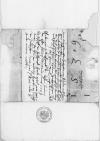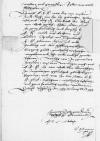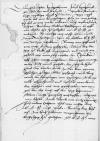Dem durchlauchten, hochgebornen fursten und hern, hern ⌊Albrechten⌋, von Gots gnaden marggraff zu ⌊Brandenburg⌋, / in ⌊Prewssen⌋, zu ⌊Stetin⌋, ⌊Pomern⌋, der ⌊Cassuben⌋ und ⌊Wenden⌋ hertzog, / burggraff zu ⌊Normberg⌋ und furst zu ⌊Rugen⌋, / unserm hochgunstigen, lÿben hern und freundt
Durchlauchter, hochgeborner furst, hochgunstiger, lyber her und freundt. / Unsere freuntliche, wÿllige dinst zuvoran. /
Wÿ negst unser bot von konniglichem hove an uns gelangt, / so hat er uns under andren / auch unsers freuntlichen bruders ⌊Nickles Nÿbschitzen⌋ brÿff mit dÿsen hir zu gelegten an Ewer Furstliche Durchlaucht geantwurt, / dÿ welche wir nicht haben woldt lenger vorhalthenn. / Thun dÿ selbten Ewer Furstlichen Durchlaucht ane vortzog schickenn. / Newes von hoff wirt uns nicht sonders geschrÿben, alleine das der ⌊thag⌋ zu ⌊Krako⌋ ÿst angangenn, / und wirdt vorgesteldt, wÿ man sich wÿder den ⌊Thurckenn⌋ uffs jhar mocht erhalten, / derwegen mancherleÿ rath wirdt gehabt, / der sÿch dohin zcewt, das beÿder stende in der ⌊Kron⌋ eÿnnes ÿtzlichen guther sollen geschatzt / und noch wirde der schatzungen von ÿtzlichem sol kriegs volck uffgenhomenn und besoldet werdennn, / das bysher, / wÿ uns geschrÿben, / von wegen der, dÿ noch uff den thag khomennn sollenn, / nicht gentzlich entslossen. / Auch wil man ⌊dÿser landt stende⌋ mit eintzÿhennn etc.
Aus andern orthern hab wir nichts, das Ewer Furstliche Durchlaucht nicht wuste, / nemlich das ⌊kayserliche maiestet⌋ ins ⌊reich⌋ zukommen vorgenhomen, ein reichsthag zcu halthen. / Hat Ewer Furstliche Durchlaucht was weÿtters und gewÿssers, / bÿtten uns woldt mÿttheÿlen / etc.
Dyweÿl Ewer Furstliche Durchlaucht weis, das wir unsermm stande nach / vor dÿ, / dÿ gebrochen haben, / Got / und auch dÿ obrikeÿtt der mensc[hen] von Gotte gesatzt, / bytten sollen, / so ÿst [un]ser gantz freuntlich und fleÿssig be[gehren, Ewer], Furstliche Durchlaucht wolde unns erhören und ... erbarn ⌊Christoff von Thawbenh[eym]⌋, [Ewer] Furstlichen Durchlaucht getrewen dÿnner und unde..., handlung mit dem hoffkurtzweÿlligen... bewegnis geubt, / genediglich vortzeÿhen u[nd] vorgebenn und ihn widerumb zu gnaden nhemenn, / welchs wir in eÿnnem vil grossern, / unserm vormugen nach, / umb Ewer Furstliche Durchlaucht, dÿ wir Gotte dem almechtigen in langweriger gesuntheit, gluckseliger regirung, / und uns in der selbten Ewer Furstlichen Durchlaucht gunst / befelhenn, / wÿlliglich beschulden und gerne freuntlich wollen vordienennn. /
⌊Ioannes⌋, von Gots gnadennn bÿschoff zu ⌊Ermelandt⌋
illustrissimae dominationis vestrae deditissimus
Ioannes episcopus ⌊Warmiensis⌋ manu propria subscripsit


